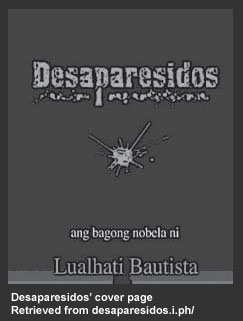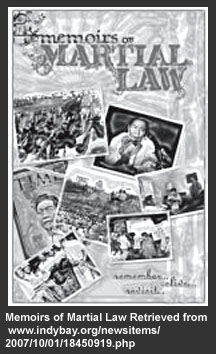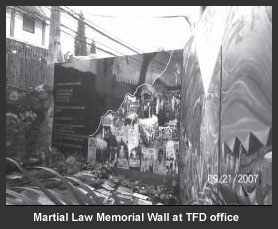Enforced or involuntary Disappearance is a form of terror utilized most
often by the state to forcibly make people disappear for one obvious
reason: to silence them from speaking out their political opinions,
standing and exercising their rights.
 Voluminous
records of testimonies of witnesses and families of victims have provided
the public the first scenario in the drama of this tragic crime against
humanity. Victims were seized at their homes, in their offices, or in
public places, by men in plainclothes usually armed with weapons but
refusing to identify themselves or present a legal proof of arrest. Lives
are stolen in the dead of the night or in broad daylight. Victims are
spirited off from the world and placed outside the protection of the law,
often subjected to torture, and even killed. Many of them are never seen
again and their fate and whereabouts remain unknown. Families of the
victims are left shattered in despair and suffering and often economically
destitute. Their long and agonizing search for their missing relatives
usually ends in vain. They are often threatened and cowed to silence in
fear of suffering the same fate. Few of the victims who are fortunate to
survive or surface after years of vanishing without a trace succumb to the
horror of the traumatic experience and try to live a life of
forgetfulness.
Voluminous
records of testimonies of witnesses and families of victims have provided
the public the first scenario in the drama of this tragic crime against
humanity. Victims were seized at their homes, in their offices, or in
public places, by men in plainclothes usually armed with weapons but
refusing to identify themselves or present a legal proof of arrest. Lives
are stolen in the dead of the night or in broad daylight. Victims are
spirited off from the world and placed outside the protection of the law,
often subjected to torture, and even killed. Many of them are never seen
again and their fate and whereabouts remain unknown. Families of the
victims are left shattered in despair and suffering and often economically
destitute. Their long and agonizing search for their missing relatives
usually ends in vain. They are often threatened and cowed to silence in
fear of suffering the same fate. Few of the victims who are fortunate to
survive or surface after years of vanishing without a trace succumb to the
horror of the traumatic experience and try to live a life of
forgetfulness.
This grim reality of the untold stories of
disappearance is what Lualhati Bautista’s latest novel is all about as it
articulates the silence that the victims and their families suffer from
this heinous crime which often strips them of their dignity and denies
them a normal life as fear becomes their constant companion.
 Desaparesidos
is the story of two activists, Anna and Roy who lived the horrors of
militarization during the martial law years in the Philippines. Their
political involvement has cost them the loss of their families who were
brutally murdered by the military. They themselves became part of the list
of people who were captured and jailed, tortured and raped, killed or made
to disappear during this dark period of our history. Like those who are
allowed by sheer luck to return to tell their stories, Anna and Roy are
able to come back to the world of the living but with dead souls. While
love finds its way to share their grief and commitment to pursue their
patriotic aspirations, it however fails to transpose their lives from the
grip of fear and anguish. When Marcos was toppled by the EDSA uprising,
they decided to go back into the mainstream and work in the open as they
joined a group of victims that filed a class suit against the former
dictator for its gross human rights violations. But even in their valiant
attempt to move on with their lives, they are continuously drawn into
silence and the pressure to forget the past which, in reality are
impossible. While they pretend to live a normal life, their anxiety besets
them with the recurring dreams of their traumatic experiences and their
lonely struggle against fear. Anna who lost her baby, Malaya, whom she
entrusted to Karla, an ex-comrade when her first husband was killed by the
military, is torn between finding her missing daughter and trying to be a
good mother to her second daughter, Lorena. Roy who is still being haunted
by guilt for killing his ex-comrade Jinky, husband of Karla, who turned
out to be a traitor and was suspected to be responsible for their capture,
is tortured by indecision whether killing a comrade is poetic justice or a
mere act of revenge.
Desaparesidos
is the story of two activists, Anna and Roy who lived the horrors of
militarization during the martial law years in the Philippines. Their
political involvement has cost them the loss of their families who were
brutally murdered by the military. They themselves became part of the list
of people who were captured and jailed, tortured and raped, killed or made
to disappear during this dark period of our history. Like those who are
allowed by sheer luck to return to tell their stories, Anna and Roy are
able to come back to the world of the living but with dead souls. While
love finds its way to share their grief and commitment to pursue their
patriotic aspirations, it however fails to transpose their lives from the
grip of fear and anguish. When Marcos was toppled by the EDSA uprising,
they decided to go back into the mainstream and work in the open as they
joined a group of victims that filed a class suit against the former
dictator for its gross human rights violations. But even in their valiant
attempt to move on with their lives, they are continuously drawn into
silence and the pressure to forget the past which, in reality are
impossible. While they pretend to live a normal life, their anxiety besets
them with the recurring dreams of their traumatic experiences and their
lonely struggle against fear. Anna who lost her baby, Malaya, whom she
entrusted to Karla, an ex-comrade when her first husband was killed by the
military, is torn between finding her missing daughter and trying to be a
good mother to her second daughter, Lorena. Roy who is still being haunted
by guilt for killing his ex-comrade Jinky, husband of Karla, who turned
out to be a traitor and was suspected to be responsible for their capture,
is tortured by indecision whether killing a comrade is poetic justice or a
mere act of revenge.
As the couple tries to pick up the pieces of what they
have left of their lives, the family that they both want to build is
slowly crumbling before they know it. The one who suffers more is their
child, Lorena, who in her childhood was puzzled by her parents’ frequent
absences and was often left by herself in houses of their unknown
relatives and friends. As she grew up, she began to harbor ill feelings
against her parents, their political work, and the movement that is
practically taking them away from her. Malaya, who came back to the
country after years of living abroad, finds out about her real mother and
searches for her with the primal curiosity to know her origin and the need
to be with her. Lorena who grew up and lived with her mother can’t feel
her loving presence. The two sisters who are separated by circumstances
are bound to face the truth about what her mother and many others have
gone through and survived in the course of the unfolding political
upheaval and the reality that the new generation of activists like Eman
must face to change society.
 At
first, I thought that Desaparesidos was a mere sequel to Dekada
’70, one of Bautista’s bestselling novels about family conflicts which
resulted in coming to terms with martial law. But Bautista has proven that
she never loses touch in a way of fascinating her readers by revisiting a
period in our history in a literary makeshift. She is truly a master of
combining social realism with historical fiction as her story intertwines
fictionalized characters with real stories of people.
At
first, I thought that Desaparesidos was a mere sequel to Dekada
’70, one of Bautista’s bestselling novels about family conflicts which
resulted in coming to terms with martial law. But Bautista has proven that
she never loses touch in a way of fascinating her readers by revisiting a
period in our history in a literary makeshift. She is truly a master of
combining social realism with historical fiction as her story intertwines
fictionalized characters with real stories of people.
What is so inspiring in this novel is how Bautista
through her characters has been able to show us that anyone, whether a
victim, a relative or a concerned individual can do something to fight
this imposed silence within us and within society by looking for an inner
connection that binds us together to make a world a better place to live
in without fears, sufferings and injustices. Bautista knows how to bring
her readers from the realm of fiction to the reality of events happening
around us. While we are made to believe that Martial Law was a thing of
the past and buried in the recesses of our country’s history,
Desaparesidos points out that nothing has significantly changed
between the period of the Marcos dictatorship and the return to so-called
democratic and constitutional system of government as the human rights
situation becomes even worse. There are still people who are being killed
or made to disappear because they are presumed to be “enemies of the
state.” It is carried out in the climate of impunity as no one is yet
to be punished from this crime including the abuses committed during
martial law. Bautista attempts to relate in the novel’s epilogue the
recent outcome of the class suit filed by the victims of martial law which
has become an uphill battle.
Today, Claimants 1081, the group of victims of human
rights violations during Martial Law, continues to fight on all fronts to
seek the reparation that its members deserve.
 Although,
one may not completely agree with Bautista’s style of storytelling no one
can argue with insights that are molded by personal experiences especially
in dealing with the dilemma of choosing between family and country which
many parent-activists try to avoid. It is not to imply that the love for
the family and country are two separate and irreconcilable priorities.
What seems to be missing is the understanding that disappearance is more
than just the physical absence of a person but what is stolen is the
intangible, inarticulate and essential meaning of our existence – as a
human person. Thus, disappearance is not just an issue of the victims and
their families but also of the society at large as it reflects the failure
of the entire social structure to ensure that life must not only be
respected and protected but it must also be allowed to grow. In
Desaparesidos, Bautista gives the people from inside the movement
something to ponder when she suggests that disappearance can also mean the
crucial absence of parent-activists in the lives of their children as they
pursue their revolutionary goals while attending to their families’ needs.
Although,
one may not completely agree with Bautista’s style of storytelling no one
can argue with insights that are molded by personal experiences especially
in dealing with the dilemma of choosing between family and country which
many parent-activists try to avoid. It is not to imply that the love for
the family and country are two separate and irreconcilable priorities.
What seems to be missing is the understanding that disappearance is more
than just the physical absence of a person but what is stolen is the
intangible, inarticulate and essential meaning of our existence – as a
human person. Thus, disappearance is not just an issue of the victims and
their families but also of the society at large as it reflects the failure
of the entire social structure to ensure that life must not only be
respected and protected but it must also be allowed to grow. In
Desaparesidos, Bautista gives the people from inside the movement
something to ponder when she suggests that disappearance can also mean the
crucial absence of parent-activists in the lives of their children as they
pursue their revolutionary goals while attending to their families’ needs.
Desaparesidos is indeed a reminder that we must
not allow silence to dwell in us but rather we all must break this silence
in order not only to articulate the voice of those who disappeared and
their families who are left behind but most importantly to echo our Latin
American brothers’ and sisters’ call for the whole world to know…Nunca
Mas (Never Again)!